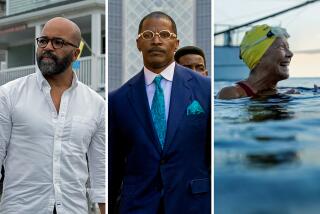Threesome Performs Like a Team in Their 1st-Time Collaboration : They delivered a 45-minute musical track with an American Indian flavor and 50 cues in 3 weeks
- Share via
Although they had never worked together before “According to Coyote,” Trinidad Krystall, Marty Krystall and John Fitzgerald functioned like veteran teammates in providing the atmospheric, evocative soundtrack to the play.
And they were under a lot of pressure: The musicians didn’t begin attending the play’s rehearsals until the first week in January and, three weeks later, they delivered a completed track of 45 minutes and more than 50 cues.
Director Peter Brosius wanted music that created a mood for the play and that had an American Indian flavor. He knew that flutist and composer Trinidad Krystall, a native of the Papago tribe who has done extensive research in American Indian music, would be an ideal participant. She came up with two or three Papago melodies, one titled “Song of Elder Brother After He Created the Spirits of Man.”
“Papago music is our favorite,” said Marty Krystall, Trinidad’s husband and a well-known woodwind artist who wrote the synthesizer parts for the “Coyote” score. “It’s complex, yet very soulful.”
“It worked well in this theatrical setting because Papago music is not overly aggressive, and it complemented the moods of the play,” Trinidad Krystall said.
Brosius also likes to use music as a character in a production, said Fitzgerald, and here the soundtrack is like a fifth member of the cast.
“It’s not just for transition, or underscoring a character. It’s part of the environment,” he said. The soundtrack is both lulling and striking, and is quite listenable on its own.
There was a great deal of improvisation in the scoring process, said Fitzgerald, a percussionist who had worked with Brosius on his 1989 Improvisational Theatre Project production of “Bocon!” “Trinidad and I would play different things at rehearsal to find out what worked, what Peter wanted,” Fitzgerald said.
“Peter might say something like, ‘I want a beautiful blanket here,’ and we’d try to translate that into music,” said Trinidad Krystall, whose past theatrical experience includes composing and performing the music for the Los Angeles-based Literary Cabaret’s 1990 production of Louise Erdrich’s “Love Medicine.”
“But he kept changing the concept of the play, and so a lot of the music we wrote would also have to be changed,” Fitzgerald said. On the soundtrack, he played marimba, drums, thunder sheet--a large, thin sheet of steel that can be struck to create shimmering, resounding effects--and hand percussion.
Once it had been decided what pieces of music went where, the Krystalls and Fitzgerald spent about 40 hours recording the music in a studio at the Krystalls’ home. Each cue was recorded on individual tapes, which are then played during a performance.
The musicians found working on the soundtrack very satisfying. “I really liked the way it came out,” Trinidad Krystall said.
“I was surprised at how much I enjoyed it, considering how much stress there was,” Fitzgerald said.










